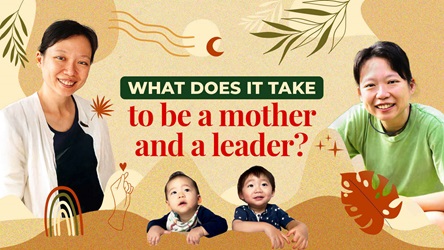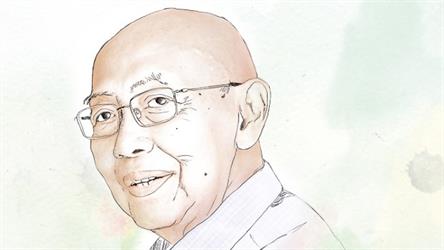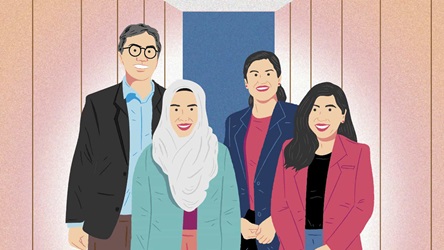“You Need To Be Tough And Rugged”
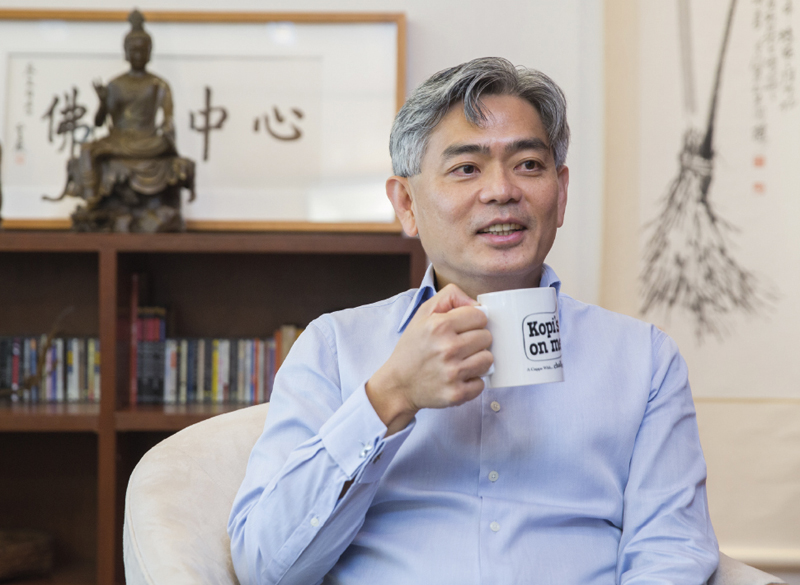
It takes about 20 years of training before a young diplomat can become an Ambassador for Singapore. To a generation of young workers used to job-hopping, committing one’s entire career to a single organisation may seem a hard proposition to swallow.
No wonder then that Mr Albert Chua, the Second Permanent Secretary for the Ministry of Foreign Affairs (MFA), is concerned: Will the MFA be able to build up a corps of officers who can go the distance?
In the interview at his Tanglin Road office, Mr Chua noted that the younger generation now receives more structured training and “love and nurturing” than before, whereas officers of his time had to learn on the go.
“We took the hard knocks, picked ourselves up. With the younger generation, we are still getting good-quality people, but are they as tough? They need to be toughened up through experience, to realise that this is a mission and to believe in service to the country.”
When Mr Chua himself stumbled into the MFA 23 years ago, he had no idea what he was in for.
The Public Service Commission teaching scholarship holder had graduated from the University of East Anglia with a degree in English, but decided that he wanted to do something different. Having applied to join the MFA instead, he was summoned to interview with then-MFA Permanent Secretary Peter Chan.
“He asked me why an English Literature graduate wanted to join MFA and I said I didn’t really know but MFA sounded interesting… and literature is about understanding human beings and ambiguity,” recalled Mr Chua. “After one and a half hours of conversation, he concluded that I had a certain spirit of ruggedness and adventure which was useful for MFA.”
Challenges abroad
That toughness is necessary. MFA officers often have to defend Singapore’s policies, facing down a room full of diplomats who are all against, for instance, the death penalty.
And they have to live overseas for years at a time, moving from country to country, with spouses and children in tow. They are in each country to befriend the locals and build a network of contacts they can access, to better understand the country and manage any bilateral or geopolitical issue.
Mr Chua, who has had postings in Taiwan, Australia and New York, explained: “Diplomacy is about how you interact with people and build relationships. Even at a very high level, whether leaders of two countries get along and trust each other will define bilateral relations.”
MFA officers also need to be “tough and rugged” as they have to wade into unfamiliar territory or crisis zones when duty calls, such as when there are air crashes or natural disasters affecting Singaporeans, who will need help.
One of Mr Chua’s more adventurous duties involved him having to find his way into post-war Iraq with a team of seven in 2003, to lead a Needs Assessment Team to see what Singapore could do. The team’s original Singapore-Kuwait-Iraq plan was thwarted when the Kuwaiti authorities declared that everyone arriving from Singapore – grappling with SARS at the time – had to be quarantined for a fortnight before entering the country.
They decided to fly to London, then into Amman, the capital of Jordan, and drive the 500km to Baghdad over 15 hours. “Our four days in Baghdad were quite peaceful but there were sporadic gunfire and bombings going on,” recalled Mr Chua.
Life can be tough for the spouse of an MFA officer, who often has to give up his or her career to accompany the officer overseas. “Married MFA officers need supportive families because the demands on them are very high.” Mr Chua’s wife used to work in the Civil Service College, but is now taking care of their only daughter. Abroad, spouses also play an important role in diplomacy.
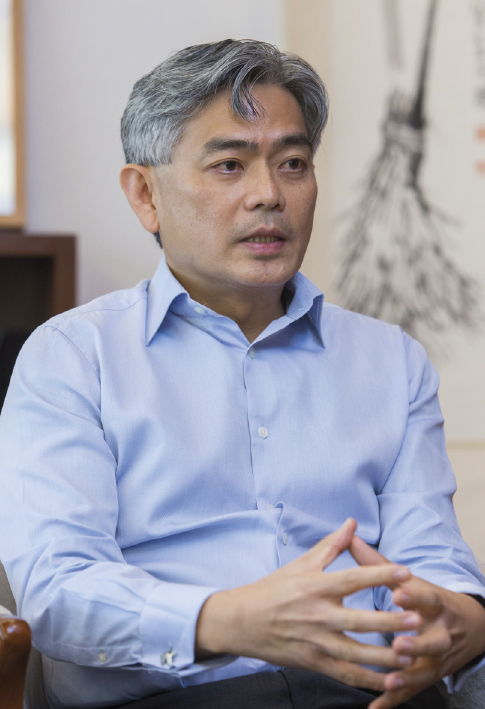
Flying Singapore’s flag
Away from Singapore, MFA officers have to be self-sufficient and self-starters, he said. “ We are told to advance Singapore’s interests overseas. What in the world does that mean?”For Mr Chua, this means one needs to be entrepreneurial, to avoid dangers and seize opportunities. He recalled when he was posted to the United Nations in New York as the Permanent Representative of Singapore in 2011: “I was advised to get to know my fellow ambassadors before I needed their votes.”

Knowing no one, he set up meetings with 163 ambassadors and 20 UN officials and met each of them all, face to face, over the next six months. It took Mr Chua four months to fix up a meeting with the Ambassador of Swaziland. When they finally met, he told Mr Chua that in his seven years at the UN, no one had ever called him for a chit-chat without an agenda.
“We talked about our families and grumbled about our bossy daughters,” Mr Chua joked. “We became the best of friends. He was reliable whenever I needed support and would help me rally his African brothers.”
Mr Chua also seized the opportunity to drive home Singapore’s role in global affairs. In 2012, he organised a year-long 20th Anniversary celebrations of the Forum of Small States (FOSS), a Singapore-led initiative with 105 members (all countries with populations under 10 million). A highlight was the inaugural conference on small states attended by Secretary of State Hillary Clinton, UN Secretary General Ban Ki-Moon and Foreign Ministers of over 30 countries.
“There was a very strong and positive response amongst the small states that although we are small, we are not helpless and we have some experience and expertise to contribute internationally,” he said.
The crisis mentality
Ensconced in their domestic comfort and security, Singaporeans are largely unaware of the MFA’s work and impact.Mr Chua does wish that Singaporeans were more informed about foreign affairs and how by virtue of Singapore’s size and circumstances, nothing can be taken for granted. He called the latter “a crisis mentality, which is a realistic appreciation of the place of small states in the larger international context.”
It is also a mentality that all MFA officers share. “If you work with us for a short period of time, the paranoia will flow into you as you deal with the hard issues arising from how the world works.”
Public officers in other agencies should also be more internationally-minded, as global developments can increasingly affect what happens at home. And while the MFA may have the diplomatic skills and international outlook, it is the domestic agencies that are subject-matter experts. “The key thing is to marry the two,” he said.

Hence the “constant nagging and flagging” of potentially impactful global issues from the MFA, and encouraging domestic agencies to take a leading global role.
Recently, the MFA noticed a softening in the global stance towards drugs and alerted the Ministry of Home Affairs (MHA) as this could have a serious impact on Singapore. Result: “MHA has now decided to play a more active role on this issue and to try to shape the international discussions.”
A subject high on the MFA’s agenda is ISIS, a threat that is increasingly seen as a global, rather than Middle Eastern, problem. For the MFA, its role is to work with other countries: “Individually, I don’t think we can solve this problem. But coming together, we can share our experiences. The only way to defeat this is to stand united together.”
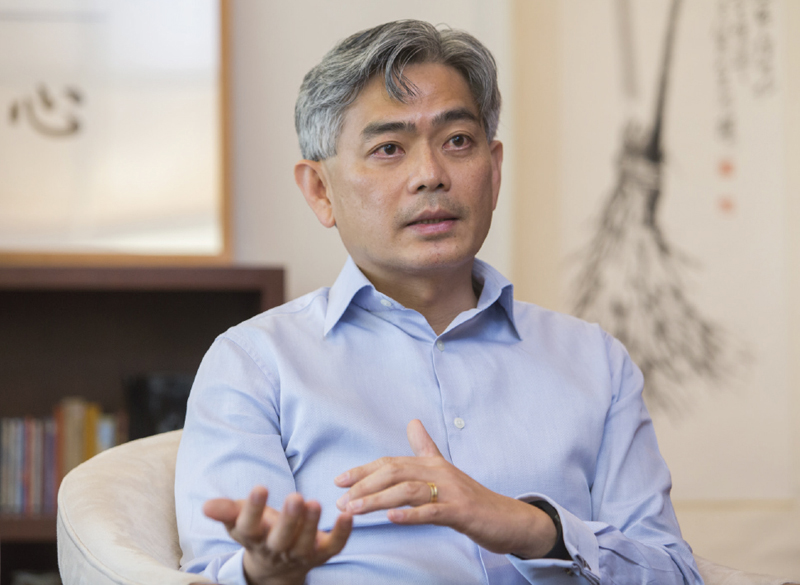
Also pressing is balancing between the United States and China. Mr Chua said: “China is Singapore’s largest trading partner but at the same time, our most important political, security and defence relations are with the US. How do you balance relations and not have to choose? How do you continue to create political, economic and strategic space for Singapore?”
Feeding the mind
Part of Mr Chua’s current reading is The Eurasian Core and its Edges, a book by Professor Wang Gungwu, one of the world’s leading experts on China. “I take Professor Wang out to lunch quarterly,” the Permanent Secretary joked, “he traverses 3,000 years of history in one lunch! I get the better end of the deal.”Typically, at any given time, Mr Chua reads one book on Buddhism, another for leisure – currently he is re-reading a series of sword-fighting novels by Gu Long – and a work-related book. “I must read,” he said, when asked how he finds the time. “Confucius said if you don’t read for three days, your speech becomes very bland (‘士三日不读, 则其言无味’)”.
The office of the ex-Rafflesian – whose formative years were spent speaking Teochew and listening to Cantonese, Hokkien and Teochew “talk stories” on Rediffusion – is testament to his love for Chinese culture and Star Wars.
Chinese calligraphy scrolls and CDs of guqin music (a traditional Chinese instrument he plays) jostle for space with his standing desk. On his table are a Yoda cup labelled “May the Force be with you” and a bowl of cutesy FOSS badges. (“May the FOSS be with you,” reads one.)
Mr Chua, who meditates every morning, ends the interview with a mantra from his Buddhist Master that he lives by: “面对, 接受, 处理, 放下”.
It means that for the many issues he has to tackle each day, he will face them, accept them, deal with them, and finally let go. Perhaps that’s how he has managed to last 23 years in a famously tough job.

What's in your cuppa?
Double espresso to start the morning; tea and water throughout the day.
Where do you take it?
I have a coffee machine in my office.
- POSTED ON
Sep 2, 2015
- TEXT BY
Wong Sher Maine
- PHOTOS BY
Norman Ng
-
Letters
Be a Willing Learner





